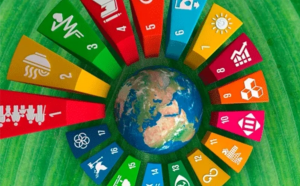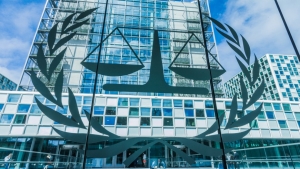In the 48th regular session of the Human Rights Council (HRC), the High Commissioner for Human Rights called for the recognition of a right to a healthy environment, which resulted in the adoption of Resolution HRC n. 48/13 [1], calling on States to implement this right. The current environmental crisis, which encompasses climate change, pollution and nature loss, directly interferes with the fulfillment of several human rights, especially the human right to water. As a matter of fact, climate change raises pressing issues in relation to water security, as it is intrinsically related to the increase of water scarcity and of environmental disasters.
Accordingly, as will be discussed in this post, the protection of the human right to water in an environmental perspective is essential for tackling the global environmental crisis. The consequences of climate change currently impact several communities worldwide and the lack of integration between the fulfillment of the human right to water with management and protection of water resources may only weaken the possibilities of adaptation and mitigation to the instabilities in water flow. As Brazil faces its worst water crisis in almost a century, the challenges for the protection of human rights and of the environment in Latin America become more apparent and pressing. To address this issue, the article discusses the development of the human right to water and its core obligations, as well as the confluences with the protection of the environment. As will be presented, the human right to water may be an important instrument for the protection and preservation of domestic and international water resources.
The human right to water in international law
Albeit not explicitly recognized in the main human rights treaties, such as the International Covenant on Civil and Political Rights (ICCPR) and the International Covenant on Economic, Social and Cultural Rights (ICESCR), the human right to water has been recognized as an essential requirement for the fulfillment of other human rights. As such, the Committee on Economic, Social and Cultural Rights adopted the General Comment n. 15, that interpreted art. 11 of the ICESCR, to formulate the elements of the right to water that were necessary for the compliance with the right to an adequate standard of living.
Following a similar approach, the Inter-American Court of Human Rights (IACtHR) formulated considerations in the light of American Convention of Human Rights’ article 4 (right to life), article 5 (right to humane treatment) and article 21 (right to property). The IACtHR ruled, in the context of Indigenous Peoples and in relation to incarcerated persons, that the State must guarantee a minimum standard of living that is consistent with human dignity. It must also abstain from creating conditions that hinder or render impossible for its population to reach this threshold. This minimum standard, as decided by the IACtHR, includes access to water and sanitation for personal and domestic use.
There are two particularities of the IACtHR’s jurisprudence that strengthen the environment’s protection through the human right to water. Firstly, in the Advisory Opinion n. 23/17, the IACtHR reiterated that the human right to water is especially vulnerable to environmental impact. It also recognized that the right to a healthy environment “protects the components of the environment, such as forests, rivers and seas, as legal interests in themselves, even in the absence of the certainty or evidence of a risk to individuals”. Furthermore, the recent decision in the Case of the Indigenous Communities of the Lhaka Honhat (Our Land) Association v. Argentina not only proclaimed the right to water as an autonomous right, but also reinforced the importance of a sustainable utilization of water resources for the fulfillment of other rights, such as the right to food and the right to health.
The human right to water does not yet have the same extent of recognition at the European level. Even though the European Court of Human Rights (ECtHR) has not expressly recognized the human right to water as a binding rule in the European Convention on Human Rights, it has developed the understanding that the impact on human health resulting from the contamination or pollution of water resources may give rise to the responsibility of States by the violation of article 8 (right to respect for private and family life), as well as in the case of deprivation of water to incarcerated persons by the infringement of article 3 (prohibition of torture).
Beyond the subsidiary protection of the right to water created and developed by international jurisprudence, the UN General Assembly, the World Health Assembly and other international fora have proclaimed in several occasions the non-binding recognition of an autonomous right to water. [2] Moreover, along with the international recognition of the right to water on the international level, a significant number of countries have codified it as a fundamental constitutional right. [3]
In the specific context of the HRC, the human right to water has received significant consideration long before the recent recognition of a right to a healthy environment. In 2010, Resolution HRC n. 15/9 affirmed that the human right to safe drinking water and sanitation is derived from the right to an adequate standard of living established by the ICESCR. This statement was reinforced by several other resolutions [4], which indicate that the human right to water could be established in customary international law.
Environmental protection and the human right to water
It is a given that the protection of the environment is intrinsically connected with the fulfillment of the human right to water. If a water resource is scarce or polluted, it will inevitably limit access to safe and affordable water for the populations concerned. Furthermore, the failure to ensure the human right to water in relation to sanitation solutions is bound to decrease the quality of the environment and waters in which the untreated wastewater is disposed.
Accordingly, even if the implementation of the human right to water is to be realized progressively, the State’s obligations in relation to the prevention of environmental harm requires the adoption of positive steps to avert the impairment of the utilization of water resources. That is, the State’s failure to protect the natural resources used for the satisfaction of the core elements of the human right to water would presumably entail the violation of its human rights obligations.
The environmental aspect is of such importance to the human right to water that the IACtHR hinted the possibility of the protection of natural resources by the Inter-American Human Rights System even without a clear risk to individuals. This approach is consistent with the increasing movement for the recognition of the rights of nature itself, which has resulted, for instance, in the attribution of legal personality to rivers.
Furthermore, even though international water law protects international watercourses and transboundary aquifers, the principle of equitable utilization and of the no harm rule are more concerned with the State’s sovereignty and its territory rather than with the consideration of nature as an object of preservation. The systemic evaluation of these obligations, along with the human right to water in an environmental perspective, might provide new approaches to the interpretation and implementation of the treaty and customary obligations applicable to international watercourses and transboundary aquifers.
In conclusion, the human right to water is an essential tool for environmental protection and preservation, as its provisions would be null without the due conservation of domestic and international water resources. The current formulation of this right, especially as interpreted by the IACtHR, is consistent with the recent developments in the international scenario for the safeguard of the environment as a community interest in international law.
However, the fulfillment of the human right to water and its integration with environmental protection is not guaranteed by the strict recognition of its core elements by the international jurisprudence. Implementation requires active participation from stakeholders and the civil society, especially considering that, in the context of climate change, decision-making in environmental matters must be able to encompass the possibilities of adaptation and mitigation, as well as provide mechanisms for access to information, public participation, and access to justice, particularly when the rights of the users and communities involved might be threatened.
Accordingly, as climate change and water insecurity arise, a human rights approach to the management and protection of water resources may be the solution to enable the formation of more resilient and engaged communities, which will be directly involved in the construction of their relationship with the environmental resources upon which their life depends. Whilst strengthening the implementation of human rights obligations, these perspectives also have the potential to assist in the systemic development of international law to better address environmental concerns in a changing world.
____________________
[1] The text of the resolution was approved with 43 votes in favour and 4 abstentions.
[2] UN General Assembly resolution 64/292 (July 2010); World Health Assembly resolution 64/24 (24 May 2011); Abuja Declaration of the first Africa-South America Summit – November 2006; Message from Beppu of the first Asia-Pacific Water Summit – December 2007; Delhi Declaration of the Third South Asian Conference on Sanitation (SACOSAN) – November 2008; Panama Declaration of the Third Latin American and Caribbean Sanitation Conference (LatinoSan) – June 2013.
[3] i.e., Congo, Ecuador, Ethiopia, Gambia, Kenia, Maldives, South Africa, Uganda, Uruguay, Venezuela, Zambia, Egypt, Sudan, Zimbabwe.
[4] Resolution HRC n. 16/2 (2011); Resolution HRC n. 18/1 (2011); Resolution HRC n. 21/2 (2012); Resolution HRC n. 24/18 (2013); Resolution HRC n. 27/7 (2014); Resolution HRC n. 33/10 (2016); Resolution HRC n. 39/8 (2018); Resolution HRC n. 42/5 (2019); Resolution HRC n. 45/8 (2020).
-

Amael Notini Moreira Bahia holds a LLM in Public International Law at UFMG. Researcher at the International Courts and Tribunals Research Group CNPq/UFMG. Legal Coordinator of Observatório Nacional dos Direitos à Água e ao Saneamento (ONDAS).





